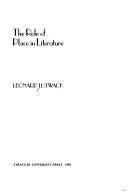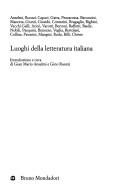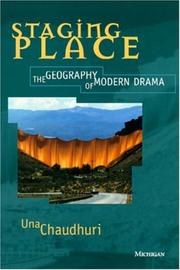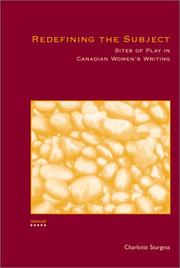| Listing 1 - 10 of 113 | << page >> |
Sort by
|

ISBN: 0815623054 9780815623052 Year: 1984 Publisher: Syracuse, N.Y. : Syracuse University Press,
Abstract | Keywords | Export | Availability | Bookmark
 Loading...
Loading...Choose an application
- Reference Manager
- EndNote
- RefWorks (Direct export to RefWorks)
Book
Abstract | Keywords | Export | Availability | Bookmark
 Loading...
Loading...Choose an application
- Reference Manager
- EndNote
- RefWorks (Direct export to RefWorks)
Book
ISBN: 9788802078687 8802078688 Year: 2007 Publisher: Torino : UTET,
Abstract | Keywords | Export | Availability | Bookmark
 Loading...
Loading...Choose an application
- Reference Manager
- EndNote
- RefWorks (Direct export to RefWorks)
Setting (Literature) --- Fiction --- Dictionaries --- Setting (Literature) - Dictionaries --- Fiction - Dictionaries
Book
ISBN: 9100556866 Year: 1995 Publisher: Stockholm : Bonniers,
Abstract | Keywords | Export | Availability | Bookmark
 Loading...
Loading...Choose an application
- Reference Manager
- EndNote
- RefWorks (Direct export to RefWorks)
Setting (Literature). --- Swedish poetry --- History and criticism
Book
ISBN: 3934105092 Year: 2005 Publisher: Hildesheim : Universitätsverlag,
Abstract | Keywords | Export | Availability | Bookmark
 Loading...
Loading...Choose an application
- Reference Manager
- EndNote
- RefWorks (Direct export to RefWorks)

ISBN: 8842490172 Year: 2003 Publisher: [Milano] : Mondadori,
Abstract | Keywords | Export | Availability | Bookmark
 Loading...
Loading...Choose an application
- Reference Manager
- EndNote
- RefWorks (Direct export to RefWorks)
Italian literature --- Setting (Literature). --- History and criticism.

ISBN: 0472095897 Year: 1995 Publisher: Ann Arbor, Mich. University of Michigan Press
Abstract | Keywords | Export | Availability | Bookmark
 Loading...
Loading...Choose an application
- Reference Manager
- EndNote
- RefWorks (Direct export to RefWorks)
Literature --- Drama --- anno 1800-1999 --- Place (Philosophy) in literature. --- Setting (Literature) --- History and criticism. --- Setting (Literature).
Book
ISBN: 9783835303294 3835303295 Year: 2009 Publisher: Göttingen: Wallstein,
Abstract | Keywords | Export | Availability | Bookmark
 Loading...
Loading...Choose an application
- Reference Manager
- EndNote
- RefWorks (Direct export to RefWorks)
Literary landmarks. --- Setting (Literature). --- Space in literature. --- Setting (Literature) --- Space in literature --- Literary landmarks
Book
ISBN: 9782919749324 2919749323 Year: 2017 Publisher: Paris : Lavoir Saint-Martin,
Abstract | Keywords | Export | Availability | Bookmark
 Loading...
Loading...Choose an application
- Reference Manager
- EndNote
- RefWorks (Direct export to RefWorks)
"Dans les images superposées de Paris, dans "les zones neutres" et "les horizons perdus", dans les lieux du trouble, les ombres et les lumières, les absences et les réminiscences ce clair-obscur de la mémoire finissent par réduire l'opacité du passé. Il s'agit dès lors de décrypter "les signaux de morse" et "les appels de phares", d'entendre les voix assourdies que renvoient les êtres côtoyés jadis et les endroits fréquentés par le romancier Patrick Modiano et ses narrateurs. Aussi ai-je tenté de capter les émotions et les sensations qui émanent de ses récits, d'entendre la musique des mots et des silences, de retrouver les instants épiphaniques qui se dégagent des personnages et des paysages. Pour ce faire, j'ai conçu cet essai comme une promenade à travers l'oeuvre magistrale de l'écrivain, qui s'étend de 1968 à 2014, en mettant l'accent sur trois romans, Remise de peine, Un pedigree et Pour que tu ne te perdes pas dans le quartier. Or, si l'observateur perçoit la "phosphorescence" qui apparaît dans ces fictions de l'intime et qui tient lieu de vérité, il mesure tout autant l'ignorance dans laquelle il demeure. L'enquête reste inachevée, volontairement laissée en suspens. Peut-être est-ce la peur de ne découvrir que des ruines et des fantômes ou au contraire celle de se confronter à l'innommable ? Ou peut-être est-ce la volonté de laisser le lecteur en alerte et de garder pudiquement ses secrets ? Peut-être est-ce enfin le désir, plus puissant encore, de composer paradoxalement avec la perte et de laisser le champ libre à l'imagination, à la création, au rêve?"-- In the superimposed images of Paris, in the "neutral zones" and the "lost horizons", in the places of the trouble, shadows and lights, absences and reminiscences - this chiaroscuro of memory - Opacity of the past. It is therefore necessary to decipher "the signals of walrus" and "the calls of lighthouse", to hear the muffled voices sent back by the cohabited beings and the places frequented by the novelist Patrick Modiano and his narrators. So I tried to capture the emotions and sensations that emanate from his stories, to hear the music of words and silences, to recapture the epiphanic moments that emerge from the characters and landscapes. For this, I designed this test as a walk through the masterly work of the writer, which runs from 1968 to 2014, focusing on three novels penalty Shed, a pedigree and to you do you not to get lost in the Carmen st. Now, if the observer perceives the "phosphorescence" which appears in these fictions of the intimate and which takes the place of truth, he also measures the ignorance in which he remains. The investigation remains unfinished, deliberately left open. Perhaps it is the fear of discovering only ruins and ghosts or, on the contrary, that of confronting the unnameable? Or perhaps it is the will to leave the reader alert and to keep his secrets secretly. Perhaps it is the desire, even more powerful, to compose paradoxically with loss and to leave the field free to the imagination, the creation, the dream?--
Memory in literature. --- Setting (Literature). --- Modiano, Patrick, --- Criticism and interpretation.

ISBN: 9789004456648 9789042011755 Year: 2003 Publisher: Leiden; Boston : BRILL
Abstract | Keywords | Export | Availability | Bookmark
 Loading...
Loading...Choose an application
- Reference Manager
- EndNote
- RefWorks (Direct export to RefWorks)
This volume takes up the challenge of Canadian women's writing in its diversity, in order to examine the terms on which subjectivity, in its social, political and literary dimensions, emerges as discourse. Work from writers as diverse as Dionne Brand, Hiromi Goto and Margaret Atwood, among others, are studied both in their specific dimensions and through the collective focus of cultural and textual revision which characterizes Canadian writing in the feminine. Current theorizing on the postcolonial imaginary is brought to bear in the interests of forging or unpacking those links which tie the Self to culture. As such, Redefining the Subject sets out to discover the limits of the aesthetic in its encounter with the political: the figures and designs which envisage textual reimaginings as statements of a contemporary Canadian reality.
Canadian fiction --- Setting (Literature) --- Women authors --- History and criticism
| Listing 1 - 10 of 113 | << page >> |
Sort by
|

 Search
Search Feedback
Feedback About UniCat
About UniCat  Help
Help News
News